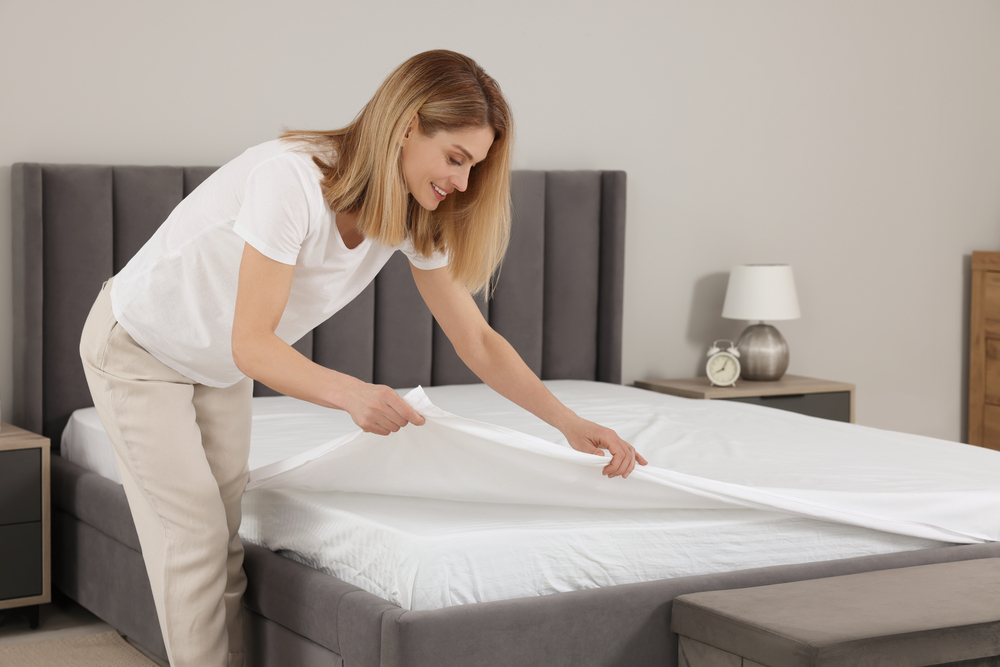Mattress Trial Period Guide

Choosing the perfect mattress is no small feat. With prices ranging from a few hundred to several thousand dollars, investing in a mattress is a significant financial decision. Each mattress type—whether memory foam, innerspring, latex, or hybrid—is crafted using different materials and technologies, contributing to a wide variety of comfort levels and support options. These differences not only affect how a mattress feels but also how it ages over time.
Some mattresses maintain their comfort and support for a decade or more, while others might start to sag or lose their shape after just a few years. Given these variables, a mattress trial period becomes essential, allowing consumers to test their choice in real-world conditions before committing fully. This guide will help you navigate through the complexities of mattress trials, ensuring you find the perfect fit for your needs and budget.
What is a Mattress Trial Period?

A mattress trial period is basically a customer-oriented policy often given to online mattress shoppers to allow them to test their new mattress in the comfort of their homes and determine whether it meets their unique sleep needs. Typically lasting between 3 months to a year, this trial length offers a more accurate assessment compared to a 10-minute test in showrooms, as you're able to sleep on your mattress under real-life conditions.
If you're unsatisfied with your purchase, most online mattress brands will offer the option of either returning the mattress or exchanging it for a different model. Some common terms you may come across while shopping for a new bed include free trial, sleep trial, and at-home trial. Overall, the main aim of a mattress trial period is to guarantee 100% customer satisfaction and confidence in the product. This helps reduce the risk often associated with buying a mattress online.
Sleep Trial vs. Warranty
A mattress warranty is a company's guarantee that it will replace or repair its product in case of any problem with its construction or materials. So, it's safe to say that, unlike a sleep trial, which is basically a test drive for your mattress, enabling you to assess its suitability, a warranty's main focus is on addressing manufacturing defects that arise later on in the life of your mattress. And when you claim a warranty, you'll not necessarily get a refund. The company can decide whether to repair your mattress or replace it with a new model. Remember, mattress brands closely evaluate claims, and repairs and replacements are often prorated depending on the age of your mattress.
Popular Mattress Brands and their Trial Periods
Buying a mattress, especially online, can be fairly nerve-wracking for all the right reasons. Fortunately most mattress brands today offer at-home trial periods, so you won't have to worry about being stuck with a mattress that doesn't suit your needs.
Below is a summary of popular mattress brands and their trial versus warranty period
Mattress Brand | Trail Period | Warranty |
|---|---|---|
100 Nights | LifeTime | |
100 Nights | 10 Years | |
100 Nights | 10 Years | |
100 Nights | 10 Years | |
90 Nights | 10 Years | |
90 Nights | 10 Years | |
90 Nights | 10 Years |
Why Do Mattress Companies Offer Sleep Trials?
Most online mattress companies nowadays offer sleep trials for several reasons.
First things first, it's worth noting that every person has different sleep needs and performances are often relative to the sleeper. For instance, if you're a heavyweight sleeper who often sleeps on his back, a sleep trial will enable you to experience the mattress in your home and return it if it's too soft to offer enough body support for proper spinal alignment. Conversely, a lightweight side sleeper will have enough time during the trial period to test the new mattress and establish whether it's soft enough to cushion the body and relieve painful pressure points.
Keep in mind that a new mattress will often feel different, especially when it's right off a package. This is because it's still new to your body, so it can take some time before you adjust to its features and start feeling its benefits. Even brick-and-mortar store purchasers can't really get to know how a mattress performs by testing it for about 10 minutes. That's why we often encourage mattress shoppers to purchase online.
We can't forget to talk about the weather changes, which often take place every 3 to 4 months. Different weather conditions need different mattress features. For instance, if it's summer, you'll need to opt for a mattress with cooling capabilities. If you buy a mattress during the winter season, you won't know how it regulates body temperature in hot seasons. And without a sleep trial, you might be left stuck with a mattress that doesn't suit your needs.
If you often share your bed with your partner, you'll need to consider their preferences too when shopping for a new mattress. Will they also find the mattress comfortable and supportive? Remember, partners don't always have the same body type and size, so you both need time to feel the mattress, adjust to its unique features, and ensure it suits both of your needs before committing to a specific brand.
What Mattress Features Should You Check During Your Sleep Trial Period?
A sleep trial period allows you to try out your mattress and look for any potential issue that might affect your comfort and sleep quality. Remember, this is an opportunity to find the perfect mattress. So, you need to pay attention to specific factors that influence mattress performance before the period expires to be able to make an informed decision.
We suggest checking out the following performance metrics:
Cooling
During the trial period, make sure you evaluate how well your mattress regulates body temperature. Temperature regulation is a vital factor in promoting a good night's sleep. Consider how hot or cold you feel at night and whether the surface helps maintain comfortable sleep temperatures. Does the mattress heat up underneath you or does it keep you cool and sweat-free during warm nights?
You also want to analyze if the mattress delivers adequate warmth and comfort during colder nights. That way, you can ensure that your night disruptions are minimized, which guarantees you restful sleep, even after the trial period.
Overall Support
Proper support is essential for a comfortable sleep environment. When looking for a mattress that supports your whole body, spinal alignment is one of the most essential aspects to consider. Poor sleeping posture may lead to spinal misalignment, causing soreness around your neck, back, and shoulders.
So, during the sleep trial, ensure your sleep surface minimizes pressure points by aligning your body properly to help alleviate pain and discomfort. Some mattresses boast zoned support systems with different firmness levels that target specific body parts, delivering customized support for different sleepers.
Comfort
To make the most of your trial period, it is also vital to pay attention to the comfort your mattress provides. While testing how supportive the mattress is can help prevent potential pain and discomfort, it is equally crucial to prioritize personal comfort. Different mattress materials offer different support and comfort levels so make sure you explore options that align with your unique sleep preferences. Whether you love the contouring properties of memory foam or you prefer a hybrid mattress' blend of body support, bounce, and responsiveness, finding the perfect balance is key.
Edge Support

Edge support refers to your bed's weight-bearing abilities along the perimeter. If you prefer sleeping near the sides of the mattress, you must check to confirm whether your bed is supportive enough to enable you to lie closer to the perimeter without sinking deep into the surface. It should also provide a stable surface that makes it much easier to get in bed and minimizes the risk of falling off during the night. What's more, a sturdy edge support extends usable sleeping space, which can really come into handy when you're sleeping with your partner.
Responsiveness
Responsiveness in a mattress is basically how quickly it can adjust to your body movements. If you often switch between sleep positions at night, a responsive mattress should make it easier to move on the surface without making you feel like you're sinking. So, when testing a new mattress, pay close attention to its responsiveness, as it directly affects comfort. If you feel like you're sleeping in quicksand, consider getting a refund.
Motion Isolation
Motion isolation is crucial for those who share their bed with a restless partner. If you fall into this category, you'll want to assess how your mattress isolates motion for a peaceful night's sleep. A good mattress should prevent the transfer of movement to your side of the bed, keeping you undisturbed throughout the night. Latex and memory foam mattresses are an ideal pick when it comes to minimizing motion transfer. You can also opt for a medium-firm bed, as it boasts the perfect balance between comfort and reducing partner disturbance.
Existing Health Concerns
If you have a specific health issue, it's crucial to take note of how your mattress affects you. Allergy management is very crucial during a mattress trial. When testing a new mattress, you must consider any reactions that might be triggered by certain materials used in the construction. Some sleepers may be allergic to common components found in mattresses, such as latex and memory foam. If you have any known sensitivities, it's wise to choose a mattress that can alleviate your symptoms to promote better sleep quality. Your best bet here is a hypoallergenic mattress that is free from potential allergens. Being aware of your allergies can also keep you from mattresses with strong odors and chemicals that could cause adverse reactions.
Noise
If you're sleeping on a noisy mattress, you can easily wake your partner when changing sleep positions or climbing in and out of bed. Unlike hybrid and innerspring mattresses, which can easily get squeaky over time, memory foam models are generally silent, making them an ideal pick for active couples. If you notice your bed emitting some annoying sounds during the trial period, it may be due to a construction issue. You may want to consider getting a refund.
Odor
It's normal for a new mattress to emit unpleasant chemical smells after it's been unboxed. This odor is called off-gassing but it usually dissipates after 3 - 4 days. If you find these chemical smells unpleasant, your best bet may be to opt for a latex mattress or a foam model with CertiPUR-US foam certifications.
Customer Support

Finally, we recommend utilizing customer support anytime you have concerns about your mattress. Remember, the main reason why customer support is there is to address any problems you may have from functionality, comfort level, and even allergen-related issues. So, feel free to use them, as they can provide valuable insights depending on their experience and knowledge of the sleep product. We also suggest returning the mattress for a refund if necessary. If you're not satisfied with the mattress' performance, don't hesitate to take advantage of the trial period and initiate a return process.
How to Prevent Your Mattress from Getting Damaged During the Sleep Trial
First, let's start with the why!
Most companies are very willing to refund your money or exchange your mattress after a sleep trial. However, you can void your mattress trial if you damage it. Damages include pokes in the mattress, liquid spills, and human-inflicted tears.
Companies often assume that any issues with a mattress are due to damages incurred during use. At The Sleepshop Inc., we uphold strict mattress care standards during our tests to prevent any damage before the trial period concludes. Over the years, we've developed numerous tips to help keep mattresses in excellent condition. Let’s explore these strategies!
Get an Ideal Bed Frame
You need to pair your bed with a solid mattress foundation to prevent uneven body weight distribution. Otherwise, you risk misaligning your spine and even damaging your mattress. So, make sure you place your new mattress on a support system that will be able to support your weight and the weight of your mattress.
Fortunately, most mattress manufacturers provide instructions on the type of bases you can use with your mattress. For instance, if you're testing a heavier mattress, you may need to use it on a solid foundation, perhaps with an extra leg at the center. On the other hand, a memory foam mattress may do well on slats spaced close together.
Use a Mattress Protector
Unlike mattress pads and toppers, mattress protectors usually act as barriers that keep contaminants, such as dirt, sweat, and dust mites from entering your mattress. When choosing a mattress protector for your bed, we suggest opting for a waterproof model that is engineered to prevent accidental spills and bodily fluids from reaching the inner layers and damaging the materials. And by keeping your mattress dry, these protectors can also prevent mold and mildew growth.
Avoid Handling Sharp Objects in Bed
Handling sharp and pointy objects in your sleep environment is risky for numerous reasons. For starters, you'll be putting yourself at great risk as accidental slips and jabs can easily cause cuts, leading to injuries. Your mattress isn't safe, either. These sharp objects can tear your duvets, bedsheets, and even the mattress covers. This will not only affect your bed's lifespan but also void your trial period, as no company will accept to offer a refund on a damaged product.
Avoid Playing and Jumping on the Bed

As much fun as it might be for your kids to treat their beds like a trampoline, this action could put unnecessary strain on your spring, causing them to wear out prematurely or even break. Keep in mind that manufacturers design beds for regular use. Excessive jumping on the mattress can create harsher impacts on the mattress, which can damage it and void your trial period. So, always encourage gentle use of the mattress and remind your kids about the importance of treating their beds with care.
Avoid Eating on the Bed Without a Food Tray or Food Stand
While eating on the bed sounds cozy, doing so without a food tray or stand can lead to accidental spills of food and drinks. This might result in stains that can be quite challenging to clean and may even affect the longevity of the mattress. Food particles can accumulate in the mattress attracting pests like ants, cockroaches, and rats. These pests might end up burrowing holes in your mattress, which not only affects its performance but can also void your trial period. Overall, using a food tray will help protect your mattress and maintain a clean sleep environment while preventing unnecessary wear.
Keep Your Mattress Clean
Washing your bedding, including your mattress, is crucial for hygienic reasons and goes a long way in protecting the mattress from premature damage. That said, check the manufacturer's guidelines that come with the mattress for the best way to clean and maintain it. You can also use a vacuum cleaner to vacuum the surface of the mattress. We also recommend blotting any stains with a gentle cleaner and a clean towel dipped in cold water. Don't get the mattress too wet, especially if you're testing a memory foam or polyfoam be
Follow the Manufacturer's Manual for Proper Care
The owner's manual is your best companion when it comes to learning how to take care of your mattress. It has helpful guidelines on when to flip or rotate your mattress, how to clean it, the maximum weight it can hold, and other useful tips for maximizing use. So, in case you're not sure how to handle your mattress during the trial period, go through the user manual for guidance.
What Happens if I Don't Like the Mattress?

Mattress trials are very effective for most online companies. So, if you decide that a mattress isn't suitable for your needs, don't hesitate to file a complaint and start your mattress return journey. However, you need to keep in mind that most companies will require you to sleep on the new mattress for at least 30 nights before you initiate a return. This gives your body enough time to adjust to the mattress before making a decision. As long as you file a complaint during the trial period, you shouldn't have a rough time returning it. Also, ensure you have all the vital details from your purchase, including the date of purchase and the order number.
Some companies offer a full, money-back guarantee while others are exchange-only, depending on the available stock. So, don't be surprised if your mattress company offers you an alternative bed to try instead. For instance, if you're returning a memory foam mattress because of its soft nature, you may be given a firmer hybrid mattress instead. Other brands may go to the extent of offering you a free comfort upgrade that can make your mattress either softer or firmer to suit your body type and sleep position.
Remember to go through the company website or contact customer care to know whether you'll be responsible for covering handling, restocking, or shipping fees. This is a crucial consideration, especially if you reside in a remote region where shipping charges tend to be higher.
What Happens to the Mattress Once I Request a Refund?
Different brands handle mattress cancellations and returns differently. Once you request a refund, the unwanted mattress often undergoes the following process:
- Inspection and sanitization - the manufacturer inspects the returned mattress for damages, stains, and wear. If the mattress is still in a usable state, they sanitize it thoroughly.
- Resale as refurbished products - some companies resell unwanted mattresses as refurbished products at discounted prices.
- Donation - if the returned item doesn't meet resale standards, your company may partner with a charity organization to donate it to those in need.
- Recycling - others pick the mattress and recycle its parts for reuse.
Note that: The specific process may greatly vary based on the manufacturer's unique policies and local regulations.
FAQs
Let's take a look at some of the frequently asked questions about mattress trial periods.
Are mattress trial periods free?
A mattress trial doesn't mean that you get the mattress free upfront. You need to pay for the mattress either fully or partially in installments before you can try it. What it means is that you might be able to get all your money refunded if you change your mind before the sleep trial period ends.
Can I end the trial period at any time?
This majorly depends on the brand. Some manufacturers set a minimum time frame before refunds are issued. Also known as the break-in period, this minimum trial period is usually 30 nights.
How can I make the most out of my trial period?
To make the most out of your sleep trial period, use the bed in different sleep positions and scenarios, such as sleeping with your partner, to see how it performs. Experiment with different bedding and temperature settings to create your perfect sleep environment. Also, take note of any improvements and discomfort during the sleep trial period. Do you wake up feeling well-rested each morning? Any pain or pressure points?
Closing Thoughts
When shopping for a new mattress, a trial period is your best friend. It gives you an opportunity to truly experience the bed to ensure it meets your needs. So, make sure you read trial policies keenly before making a purchase decision. And in case you find that the bed isn't the right fit, consider adding to your calendar a reminder to return the mattress before the trial period expires. Mattress companies are very strict and you'll rarely find one that will offer a refund if you're late even with a few hours. As great as a mattress trial is, we still recommend doing your own research by checking reviews online before making purchases. This will give you insight into the comfort, durability, and overall performance of the bed you're considering.
Gabe is the newest member of The Sleep Shop team. If you like the design of The Sleep Shop, give Gabe a thumbs up. He’s a digital marketing and design guru and the brains behind the design and SEO of The Sleep Shop. He also won’t say no to testing a ton of mattresses either, and helps on almost every mattress review.
Learn More About Gabe
